Showing 109–120 of 151 results

Dr. Samanta studies the sacred complex of Ujjain the ksetra itself, the Sipra river, bathing ghats, etc. He also investigates the linkages between this cultural centre and the cultural area and compares this sacred complex with others.
An anthropologist of wide repute here profiles Ujjain: a millennia-old, pilgrim centre that has been celebrated in history, legend and mythology. Located on the eastern bank of the Shipra in Malwas culture-area in Madhya Pradesh (Central India), it is a major link in the sacred network of the Hindu India. And has been traditionally venerated all across the subcontinent as one of the barely four sites for the periodic kumbha melas (religious congresses). This ancient city of Avantika (or Ujjayini), in fact, exhibits all that has gone into the shaping of Hindu ritualistic behaviour. Yet the crowning glory of Ujjain is centred around Mahakal: Lord Shivas temple, which is believed to be old beyond history. In opening out the cultural panorama of Ujjain, Dr. Samanta spotlights everything that reinforces the sanctity of this sacred complex: like, for instance, the ksetra itself, the Shipra river, bathing ghats, crematoriums, priests, preachers, pilgrims, mystifying rituals, religious discourses, festivals, yatras, pageants, ascetics congregations, and godmens institutions with meticulous description of the Mahakal temple which, generation after generation, has compelled country-wide attention. The book also investigates the linkages between this cultural centre and the cultural area, and how this sacred complex compares with its counterparts elsewhere in India. The author has, for this study, employed standard anthropological techniques, coupled with several spells of his fieldwork and his personal interviews with a number of key informants. Also included here is a painstakingly compiled glossary of non-English words.
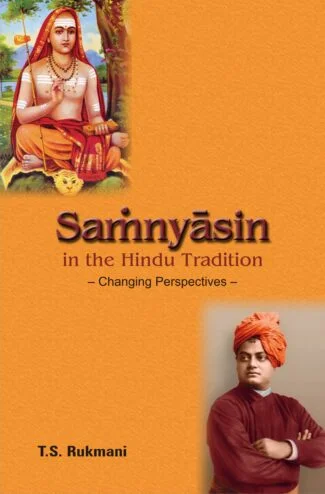
This book tries to look at samnyasins and the samnyasashrama in their long existence from the times of Shankara to the present day and also throws light on how scholars, common people, as well as the samnyasins themselves view their roles, both as individual personalities and as persons living in an institution relating to society as a whole.
The present book, Samnyasins in the Hindu Tradition: Changing Perspectives, covers a wide territory, trying to look at the samnyasins and the samnyasashrama in their long existence from the times of Shankara to the present day. This book traverses a slightly different trajectory from the usual book on samnyasins as it attempts an overview of the samnyasin and the institution over a long period from Vedic to post-Independence times and speculates on the future of the institution as well. Samnyasins and scholars not only from India, but from countries as diverse as Canada, South Africa, UK and USA also figure in this collection. The samnyasashramas covered also range from the traditional Advaita, Vishishthadvaita and Dvaita to include many more later ashrams such as the Vira Shaiva (Lingayat), Dharmapuram Adheenam, Arya Samaj, Shivananda Ashram, Ramakrishna Mission, Swami Narayan and many others. Another departure from other books on the subject is that it also compares institutions like the Ramakrishna Mission for instance, as they function in India and in foreign countries where they have established ashrams. In the midst of varied opinions regarding the samnyasin and the samnyasashrama this book will throw light on how scholars, common people, as well as the samnyasins themselves view their roles, both as individual personalities and as persons living in an institution relating to society as a whole.
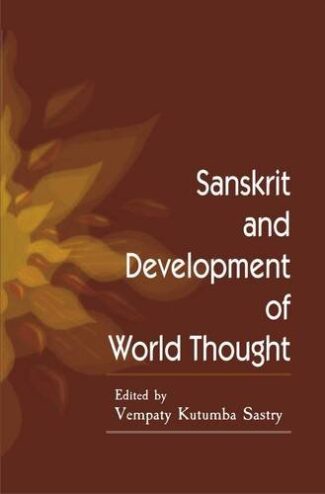
The book, proceedings of an international seminar, contains fourteen high-value research papers. It delves deep into the contributions of Sanskrit across varied fields of the knowledge system like linguistics, phonetics, philosophy, mathematics, grammar, medicine, ecology, management, Natya, public administration, poetry and poetics, among others.
This volume, a compilation of fourteen research papers of high value, presented at an international seminar organized by the Rajiv Gandhi Campus of Rashtriya Sanskrit Sansthan, Srngeri, highlights the contribution of Sanskrit to the development of world thought.
The first available text of the entire human race is Rigveda, and it is in Sanskrit. Since then the text-writing tradition of Sanskrit through ages has significantly contributed to the world thought, be it philosophy, mathematics, astronomy, grammar, medicine, ecology, public administration, poetry and poetics, among many other branches. Taking a cue from such a historical lineage, this volume showcases topics the contributions of ancient Indian thinkers to linguistics; some speculations on the contribution of Sanskrit to the world thought; significance of Ramayana in world literature; Sanskrits influence on Western phonetics; arthamatralaghava; elements of ecology in Ramayana; techniques of Theodor Stcherbatsky and his followers in translating Sanskrit philosophical texts; Sanskrits contribution to conscious studies; donation and value: its concept and expansion; Abhinavaguptas sarvamsarvatmakam; management wisdom which permeates in Sanskrit texts; twists and turns of Yoga in America; perspective of inspirational leadership from Gita; and reception of Natya in Europe, specifically in Croatia.
The icing on the cake is that the book presents research papers of the top three Sanskrit scholars of the world. This, with other scholarly articles, makes the volume a collectors choice.
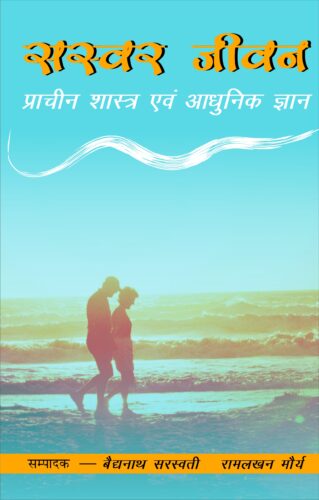
This book explains the concept of life across different religions Þ Hindu, Buddhist, Jaina, Muslim and Christian Þ based on Shastras; life and its essence based on Upanisads, Gita, and other Shastric and Puranic teachings; and attempts to understand life in a scientific way with the help of modern science, along with the mysteries of life from various angles.
This book, divided into three parts, presents the independent thoughts of distinguished scholars on the satiety of life, its various styles and meanings in reference to religion and scriptures vis-à-vis modern science. The essays in the first part, based on the Shastras, try to explain the conception of life in Hindu, Buddhist, Jaina, Muslim and the Christian religions. The second part aims to understand the subject of Life and also to explain its essence on the basis of the Upanishads, Gita and other Shastric and Puranic teachings. The writings focus on, among other things, the mystery of life and death, the regularity of life, the effect of music on life, and the calculation of life on the basis of astrology. The third part (Modern Science) is a sincere attempt to understand life with a scientific approach. A logical explanation has been crafted on dependence on each other in life analyzing several literary references. This part discusses two aspects of life internal and external, life from a void to infinity, life being always out of bounds of time, life in a continuous flow of thoughts in Indian philosophy, etc. This anthology tries to explain the mysteries of life from various angles and will prove to be benefical to the researchers and students of Indian culture.

A compilation of seminar papers by Indian and foreign experts brings alive ancient Indian developments in science, technology and medicine. The book presents Vedic quest in science and metaphysics with a special emphasis on ancient science and contemporary ideas.
The volume comprises seminar presentations by experts from India and abroad involved in the study of development of the natural sciences in ancient India. It offers eighteen papers from the seminar that showcase and project the Vedic literature as a treasure trove of vast knowledge that covers various branches of learning. The papers in particular discuss the ancient developments in science and technology: logic, mechanics in Sanskrit literature, Indian mathematics and its application in the Vedas, besides production technology and mechanical engineering, environmental science and roots, applicative wonders and scientific validation of Ayurveda. They involve a deep study of the Vedic understanding and description of sound and speech as para, pashyanti, madhyama and vaikhari. They also deal with the Indian perspective on the spirit and some mahakavyas of Indian philosophy. They scrutinise various theories on matter, causation, metals, dreams and motion, according to the Vaisheshika philosophy and underline the relevance of ancient knowledge to the contemporary world, especially in relation to the Vedic physics, environmental science and Ayurveda. They reiterate in unison the scientific vision of the ancient sages who held the keen eye of a poet-artist even while bringing to light modern and advanced ideas. The papers include references to various commentaries and studies on scientific and mathematical treatises, like Katyayana’s Shulbasutra and Vaimanikashastra of Bharadvaja.
The book will interest Indologists, particularly concerned with the study of ancient science, technology and mathematics, as they evolved in ancient India.
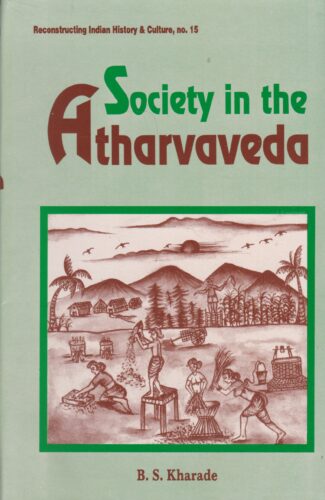
The Atharvaveda delineates the life of the common man in ancient Indian village community. The book focuses on farming and cattle breeding, crafts, religion, daily preoccupations and fashions, role of women and their problems, etc.
Of the Vedas the Atharvaveda, the Veda of the masses, is unique. Unlike the Rig, Sama and Yajur Vedas, the Atharvaveda delineates the life of the common man in the ancient Indian village community the village farmer, craftsman and others who formed the core of the agriculturist society of the time. Modern scholarship has focused much on the vedatrayi but little has been written on the Atharvaveda. Society in the Atharvaveda not only attempts to address the dearth of scholarly studies on the Atharvaveda but it is also perhaps, in recent years, the first ever study of the Atharvaveda from the point of view of the common people. The Atharvavedic verses throw light upon a wide range of themes and all these are discussed here: topics from farming and cattle breeding, village crafts, religion, daily preoccupations and fashions of the people, role of women and their problems in day-to-day life, crime and degenerative practices like adultery and gambling, to trade and travel means and routes, loan facility, taxation, political administration and mans response to his environment. The author traces this Veda as the source of many traditional folk songs that are sung even today by the common man at work in the villages. This systematic survey dispels the widespread notion that the Atharvaveda is subordinate to the vedatrayi; rather the author shows that it occupies an unrivalled importance in Vedic literature largely owing to its preoccupation with the life of the people at large. The book abounds with Atharvavedic verses; a number of verses are cited to bring out each and every aspect of common life and living. With meaningful appendices, this scholarly work would provide interesting and useful research and reference material to Vedic scholars especially those keen on studying the Veda of the masses in a fresh perspective.
The Socio-Literary and Cultural Study of Indian Society from Ancient to Modern is a search for India’s heritage: Hindu, Sufi and about Nationalism and India’s freedom from her colonial past. It is analytical but not learnedness. The author believes as Iqbal, the famous Urdu poet, said: “Transcend your reason because though it is a glow, it is not your destination; it can only be the path to the destination show.” People, both Indian and foreign, who want to understand Indian heritage from Ancient to Modern in a simple, agreeable style and friendly manner, is the author’s destination. In this volume, he has tried to demolish many myths like dharma is religion, Vedas are Śruti though the Almighty ordered six ṛṣis to write them down. A Hindu is just not emotional in mind, he also believes in analytic discussion (tarka). Upaniṣads are not just created by ṛṣis but also by a revolution unfolded by the students by barraging questions after questions.By explaining about the vitality of India and many other subjects, the book elucidates many things about the idea of India in an authentic manner. The readers will find here many varieties of theological explication, ultimately leading to the celebration of life while searching for the divine and realizing the self.
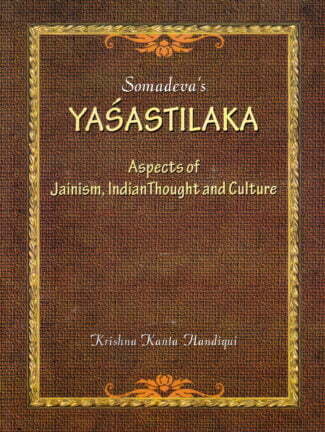
This book is notable as an encyclopaedic record of literary, socio-political, religious and philosophical data that throws light on the cultural history of the Deccan in early medieval India. It discusses Somadeva, his age and gives a synopsis of Yashastilaka, throws light on Jaina dogmatics, religious poetry, moral and religious stories and myths and legends.
Yashastilaka by Somadeva, composed in ce 959, is a Jaina religious romance written in Sanskrit prose and verse. It is notable as an encyclopaedic record of literary, socio-political, religious and philosophical data that throws light on the cultural history of the Deccan in early medieval India. This volume presents a critical study of the work, providing a comprehensive picture of the life and thought of the time of Somadeva. It begins with a discussion on Somadeva and his age and gives a synopsis of Yashastilaka. it examines the Yashastilaka as a prose and a religious romance, a socio-political record and as an anthology of Sanskrit verse. The book discusses various philosophical doctrines in Indian thought. With many detailed references and footnotes, it reveals the Yashastilaka as a work that expounds the cardinal teachings of Jainism. It throws light on Jaina dogmatics, religious poetry, moral and religious stories, and myths and legends in the process of examining the work. The volume also has supplementary notes incorporating the results of studies on Somadevas relations with the Vemulavada Calukyas and the locality in which he wrote his masterpiece.

This book is the first attempt at a systematic cultural-anthropological study of the stonemill tradition the grinding of the peasant women who singing for ages on their hand-mills have articulated tradition in their work-songs.
Tangible patrimony usually attracts attention and efforts of preservation. Intangible cultural traditions do often go with the winds of history when their social and material setting disappears. Such is the case with the songs that women in India, while grinding before dawn, have kept singing for ages on their hand-mill. Aside from the male society, they hoarded up for themselves a non-material matrimony. Today, though, motor driven flour-mills have put to rest these voices of silence, their legacy remains with them: immense and immemorial, purely feminine and oral, anonymous and personal, collective and intimate. Words from the heart, they glitter like flames in the domestic hearth. This book is the first attempt of systematic cultural-anthropological study of that unique tradition. It offers keys to apprehend it. Why should this tradition, first of all, originate from a shared compulsion to open up ones heart? This differentiates the women singers intentionality from the didactic treatment of pundits and sants who make grinding and grindmill the allegory of an advaitic bhakti. For women Lakshmis dedicated to serve the Fortune of their family and its lineage life in plenty is their raison detre. When preachers and swamis advocate a holy insensibility to earthly things and fellow human beings, the work of grinding epitome of womans office carries worldly utopias of abundance and reveals a quest for salvation through bonds of affective attachment. Eventually, the study raises radical questions on such crucial concepts as those of bhakti, tradition, the status of popular traditions versus elaborate constructs of literati. The symbolism of the stonemill in religious Marathi literature is constrasted with the experience of grinding of peasant women as the latter articulated it in their work-songs. What is sought is an epistemological insight into the cognitive processes which result in the dialectic blend of affinity and glaring inconsistency that one observes between those two levels of cultural creativity.
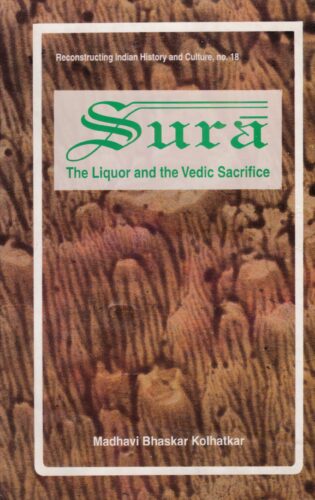
The work offers an in-depth study of the sautramani Vedic sacrifice in its caraka and kaukili forms. It shows how the brahmanas compare it with a soma sacrifice, and how sautramani itself has evolved over time.
Associated with wrath, gambling and, at the symbolic level, with darkness and misery, sura has been strongly condemned in Vedic literature. Yet, paradoxically, it has not just found its way into a Vedic sacrifice itself: called sautramani, but has even been sanctified in the rajasuya and punarabhisheka rituals as well. However, it is sautramanis sacrificial fire alone to take in liquor as an oblation material. Dr. Madhavi Kolhatkar here offers an indepth study of this sura-related Vedic ritual: of both its caraka and kaukili forms, together with all their attendant details. The book explores the possible origin and nature of sautramani sacrifice, addressing itself to a range of the hitherto-unanswered questions, for instance; How did sura come to have its acceptance in a shrauta ritual (like sautramani), despite its outright disapproval in the Vedic texts? Why is the sautramani performed after rajasuya? Is there any linkage between sautramani and punarabhisheka which both happen to involve the sura-ritual? How is, then, sautramani related to the agnicayana? And, what is the underlying importance of the myths that tell about the primeval performance of the sautramani? In spelling out the social, medicinal and ritualistic significance of sautramani, the author also shows how the Brahmanas often compare it with a soma sacrifice, and how sautramani itself has evolved over the time. In the context of this Vedic ritual, she also highlights the hierarchic contentions between the brahmanas and the kshatriyas in the ancient Indian society. It is a piece of valuable research for Indologists, especially the scholars of Sanskrit, Vedic studies and ancient Indian history and culture.
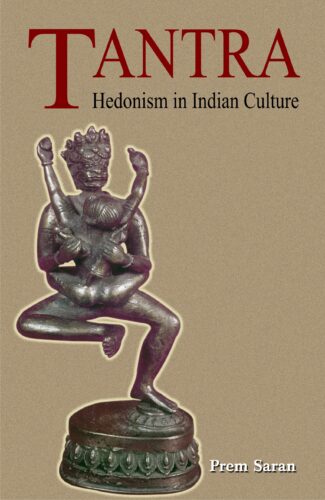
This is a cultural-anthropological study exploring those hedonistic aspects of the pan-Indian heritage which affirm that the pleasurable, especially the sexually pleasurable, is natural as a means to achieve the highest mystical experience.
This is a brilliant cultural-anthropological study exploring those hedonistic aspects of the pan-Indian heritage which, represented by centuries of the non-Vedic, Tantric tradition, affirm that the pleasurable, especially the sexually pleasurable, is natural as a means to achieve the highest mystical experience. Himself a Tantric initiate, Prem Saran offers a compelling, sympathetic analysis of Tantrism, its place in the Bengali and Assamese cultures, and its pervasiveness in pan-Indian thought and ritual generally. Prem Saran’s is also a cultural critique of modern Indian values and life-ways. In addition, it is an exercise in methodology, employing certain anthropological tools and concepts like Cultural Debate, Cultural Criticism, Hindu Renaissance and Pizza-effect the last three having been developed by the late Professor Agehananda Bharati whom the author acknowledges as a constant source of encouragement during the last decade.
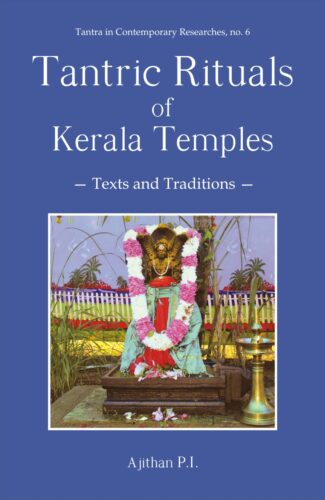
This volume presents an in-depth study of a distinct temple ritual cult of Kerala, a tradition deeply rooted within the Vedic ritualistic fold and characterized by Smarta-Pauranika beliefs and customs, which still remains to be a less explored subject, and its present institutionalized structure.
Kerala Tantra is a regional phenomenon, which is an offshoot or synthesis of Saiddhantika and Pancaratra tantric ritual rites. It is a tradition deeply rooted within the Vedic ritualistic fold and characterized by Smarta-Pauranika beliefs and customs.
This volume is a general, but a serious and in-depth study of distinct temple ritual cult of Kerala. Kerala Tantra still remains to be a less explored subject. There is no exclusive study on the ritual peculiarities of Kerala Tantra. This book focuses on filling that gap covering extensively the prominent characteristics of the unique ritual cult of Kerala.
The data presented in the book are based on many unpublished and less-known, but authentic manuscripts of late medieval period, and interviews with previous and current generations of tantrins and their testimonies. It covers the great traditions of Tantra, Kerala Tantra, and transmission of tantric knowledge through formal and informal methods. It also talks about the institutionalization of Tantric education, taking a cue from the context of Vedic and Sanskrit education of Kerala.
| × |
|
Ancient Indian Scientific Thought and Modern Theories 2 x ₹315.00 |
| × |
|
Friendship 1 x ₹198.00 |